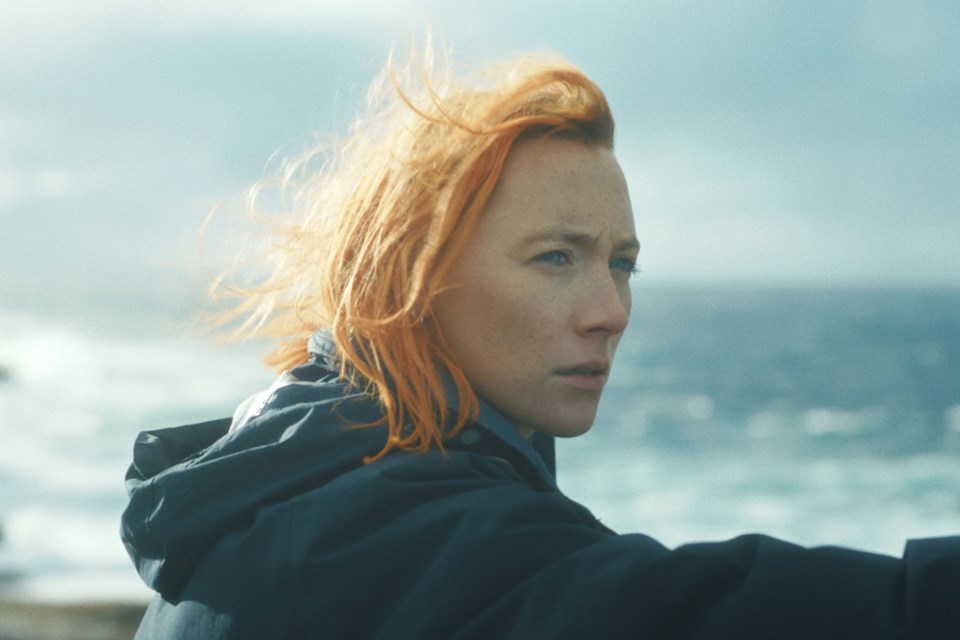At some point during “The Outrun,” it occurred to me that watching act is a bit like looking into a magnifying glass: Everything somehow feels a bit clearer, sharper, more precise.
This singular actor gives one of her finest performances in a of addiction that is poignant, sometimes beautiful but always painful to watch — and would likely be too draining if not for the luminous presence at its core. Would it even work — at all — if Ronan, who also makes her producing debut here, weren’t onscreen virtually every second?
Luckily, we don’t need to imagine that. Ronan, who plays a 29-year-old biology student named Rona (the name comes from a tiny island off Scotland) serves as both star and narrator, speaking the words — sometimes poetic — of the addiction memoir by Amy Liptrot. The script, adapted by Liptrot and director Nora Fingscheidt, makes frequent use of fantasy and whimsy, even veering into animation. Some may find these deviations a distraction from the plot, but they are frequently mesmerizing.
Besides, plot is a loosely defined thing here. We go back and forth in time so frequently that sometimes only the changing color of Rona’s hair indicates where we are on the timeline. It takes a while to get used to this, but the uncertainty starts to make sense. We are, in a way, inside Rona’s mind, experiencing the fits and starts of her journey. And recovery is hardly a linear process.
There's a fine supporting cast, but the true second star is nature itself. The film is based mainly in the Orkney Islands off Scotland, a windswept landscape that can be both punishing and restorative. It can also be stunning, especially the sea. And the sea is where we start, learning that Orkney lore holds that when someone drowns, they turn into a seal, but at night they return ashore in human form and dance until dawn.
We see a seal underwater, and then we see Ronan herself dancing — bathed in red light on a dance floor — and then falling down, blind drunk.
After this flashback, we learn Rona has come back home to her childhood home for an extended visit, after a decade in London, where addiction took hold and ruined her relationships — especially with thoughtful boyfriend Daynin (Paapa Essiedu), who achieved success as she disintegrated.
From nightlife in Hackney, London, to a sheep farm in Scotland, where the days of sobriety are ticked off for us — 30, 90, 117. The challenges here are different. Rona’s father, Andrew (Stephen Dillane), is loving but suffers bipolar episodes. Due to his debilitating illness he lives away from his wife, Annie (Saskia Reeves), who has turned to religion to cope — and that's the only solution she can offer Rona.
Deeply lonely and always on the precipice of relapse, Rona sees a crack of light in the darkness when she takes on volunteer work with the Royal Society for the Protection of Birds, given the job of surveying the Orkney Islands for the disappearing corncrake. This bird needs help to survive, and soon it seems to represent Rona herself.
But Rona’s troubles follow her no matter how deep into the countryside she goes. As she tells fellow addicts in a devastating flashback from her alcohol recovery group, what she misses most is how good alcohol made her feel. At another point, she tells someone she'll never be happy if she's sober — and you believe her. In yet another harrowing scene, a relapse has her howling to her mother: “All that praying didn't help me, Mum!”
Eventually, Rona, aiming to get even farther from civilization than mainland Orkney, repairs to the tiny island of Papay — an island, as she notes, that is off an island, off another island, off another island, and off another. Here, during a brutal winter in a tiny bird warden’s house, interacting only with the town’s sparse population, Rona starts to heal. (Liptrot spent two winters here, writing her memoir.)
Perhaps Ronan’s most impressive accomplishment is how she delineates the stages of Rona’s journey with such clarity — even down to the physical movement of being drunk, first a bit, then a lot (she worked with the talented choreographer Wayne McGregor) and how one changes physically during recovery.
And then there's her face. We see a translucent quality in it as Rona begins to embrace nature — her own, and that around her — and look to a new future. A future that may even include laughter.
“The Outrun,” a Sony Pictures Classics release, has been rated R by the Motion Picture Association “for language and brief sexuality.” Running time: 118 minutes. Three stars out of four.
Jocelyn Noveck, The Associated Press




